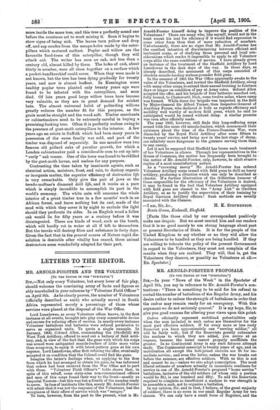LETTERS TO THE EDITOR.
MR. ARNOLD-FORSTER AND THE VOLUNTEERS.
[TO THE EDITOR OP THE • SPECTATOR.'9
SID,—Not only every Volunteer, but every lover of fair play,
should welcome the convincing array of facts and figures so ably marshalled in your columns by "Volunteer Field Officer" on April 8th. As he clearly proves, the number of Volunteers (officially described as such) who actually served in South Africa represented merely a percentage of those whose services were placed at the disposal of the War Office.
Lord Lansdowne, as every Volunteer officer knows, in the first instance at all events, brought into play every conceivable device and excuse for refusing offers of service. In nearly every instance Volunteer battalions and batteries were refused permission to serve as organised units. To quote a single example. In January, 1900, Colonel Allen, commanding the (Sheffield) 4th West York Artillery, offered to send out a battery of field artil- lery, and, in view of the fact that the guns with which his corps was armed were antiquated muzzle-loaders of little more value than scrap-iron, to equip it with latest-pattern guns at his own expense. Lord Lansdowne, after first refusing the offer, eventually accepted it on condition that the Colonel could find the guns.
Imagine the latter's feelings when, on applying to the firm from which he had arranged to obtain his guns, he was informed that orders had been received from the War Office not to part with them. "Volunteer Field Officer's" table shows that, in spite of this rebuff, some sixty-nine non-commissioned officers and men of this corps found their way to the front—mostly as Imperial Yeomen—but this was but a fourth of the number ready to serve. In face of incidents like this, surely Mr. Arnold-Forster will admit that it was not the response of the Volunteers, but the acceptance of their offers of service which was "meagre." Arnold-Forster himself doing to improve the position of the . Volunteers ? There are many who, like myself, would not in the least resent his zeal for efficiency if it would find expression in some other form than that of mere reduction of numbers. Unfortunately, there are no signs that Mr. Arnold-Forster has the smallest intention of discriminating between efficient and inefficient corps, or of studying those personal and local con- siderations which render it impossible to apply to all Volunteer corps alike the same conditions of service. I have already given an instance of the treatment of the Sheffield Artillery by Lord Lansdowne in the dark days of the war. In those days, as already described, the armament of this corps consisted of obsolete muzzle-loading sixteen-pounder field guns.
In the summer of 1901 the War Office apparently awoke to the value of the Volunteers, and invited the Sheffield Artillery, along . with many other corps, to extend their annual training to fourteen days or longer on condition of pay at Army rates. Golonel Allen accepted the offer, and his brigade of four batteries marched out, fully horsed, to Chatsworth Park, some twelve miles, where camp was formed. While there the brigade was inspected, in the field by Major-General Sir Alfred Turner, then Inspector-General of Auxiliary Forces, who declared it both as regards efficiency and mobility well worthy of modern field guns, which he said he anticipated would be issued without delay. A similar promise was soon after officially made. • The year 1905, however, still finds this long-suffering corps armed with the same old muzzle-loaders, which commenced their existence about the time of the Franco-Prussian War, were discarded by the Royal Field Artillery after some fifteen to twenty years' service, and being now in the last stage of decay, are infinitely more dangerous to the gunners serving them than , to any enemy.
Let it not be supposed that Sheffield has borne such treatment of her Volunteers in silence. Through her representatives in the House of Commons, the matter has frequently been brought to the notice of Mr. Arnold-Forster, only, however, to elicit evasive replies of a most unsatisfactory naeure.
As a "crowning mercy" Mr. Arnold-Forster has ordered Volunteer Artillery corps armed with field guns to drill as heavy artillery, producing a situation which can only be described as chaotic. If a further illustration of the Gilbertian humour of those responsible for the efficiency of the Volunteers is desired, it may be found in the fact that Volunteer Artillery eqnipped with field guns are classed in the "Army List" as Garrison Artillery, so as to justify the supervision of their training by Royal Garrison Artillery officers ! Snell methods are usually associated with the Chinese.
—I am, Sir, &c., H. K. STEPHENSON.
[Facts like those cited by our correspondent positively make one despair. But we must remind him and our readers that it is no good merely to use strong language about past or present Secretaries of State. It is for the people of the United Kingdom to say whether or no they will allow the Volunteers to be handled as they are being handled. If they are willing to tolerate the policy of the present Government in regard to the Volunteers, they must not complain of the results when they are realised. They will, that is, get the Volunteers they deserve, or possibly no Volunteers at all.— ED. Spectator.]


































 Previous page
Previous page